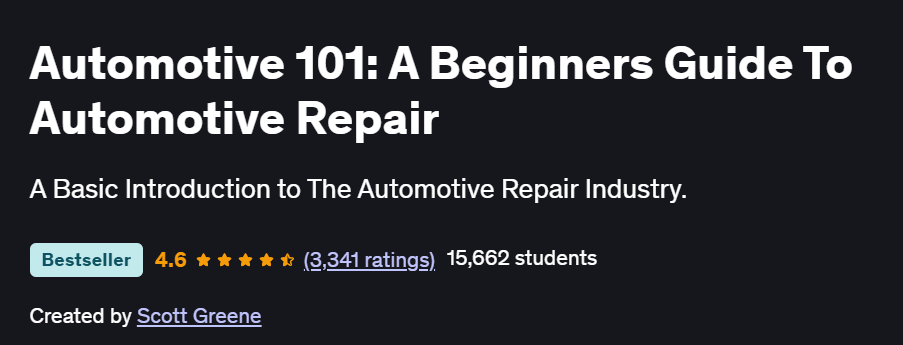What you will learn in Automotive 101: A Beginners Guide To Automotive Repair Course
Understand the fundamental components and systems of modern vehicles.
Gain practical knowledge on performing basic automotive maintenance and repairs.
Learn safety protocols and proper tool usage in automotive repair.
- Develop skills to troubleshoot and diagnose common automotive issues.
- Prepare for entry-level positions in the automotive repair industry.
Program Overview
Introduction to Automotive Repair
⏳ 20 minutes
Overview of the automotive repair industry and the importance of understanding vehicle systems.
Safety and Tools
⏳30 minutes
Introduction to safety protocols and essential tools used in automotive repair.
Drivetrain and Braking Systems
⏳ 40 minutes
Detailed explanation of drivetrain components and braking systems, including their functions and maintenance.
Ignition and Cooling Systems
⏳ 40 minutes
- Understanding ignition systems and cooling mechanisms, their components, and troubleshooting methods.
Basic Maintenance and Repair Techniques
⏳ 50 minutes
Hands-on guidance on performing basic maintenance tasks and repairs on personal vehicles.
Get certificate
Job Outlook
- High Demand: The automotive repair industry is experiencing steady growth, with a consistent demand for skilled technicians.
- Career Advancement: Completing this course can serve as a stepping stone towards more advanced automotive training and certifications.
- Salary Potential: Automotive technicians can earn competitive salaries, with potential for increased earnings through specialization and experience.
- Freelance Opportunities: Skills gained can lead to freelance opportunities in vehicle maintenance and repair services.
Specification: Automotive 101: A Beginners Guide To Automotive Repair
|
FAQs
- No prior mechanical or automotive knowledge is required to start the course.
- Introduces essential car components, systems, and their functions.
- Teaches basic tools, safety procedures, and maintenance techniques.
- Provides practical demonstrations for hands-on understanding of common repairs.
- Covers essential maintenance like oil changes, brake checks, and tire care.
- Teaches how to diagnose common issues and identify warning signs.
- Provides guidance on using basic automotive tools correctly and safely.
- Helps learners build confidence to handle minor repairs without professional help.
- Introduces fundamental mechanical concepts and repair techniques.
- Helps learners understand automotive systems, preparing them for more advanced courses.
- Provides insights into troubleshooting and problem-solving skills required in the industry.
- Builds confidence to pursue further training or entry-level automotive roles.
- Explains automotive systems, functions, and principles clearly.
- Includes step-by-step demonstrations of common repair and maintenance tasks.
- Encourages hands-on practice to reinforce understanding of mechanical concepts.
- Provides tips for safe handling of tools and car parts during repairs.
- Recommended study time: 3–5 hours per week for optimal learning.
- Includes short practice sessions for hands-on tasks to reinforce concepts.
- Encourages revisiting lessons and exercises for better retention and skill mastery.
- Regular engagement helps learners gain confidence in performing basic car repairs independently.





